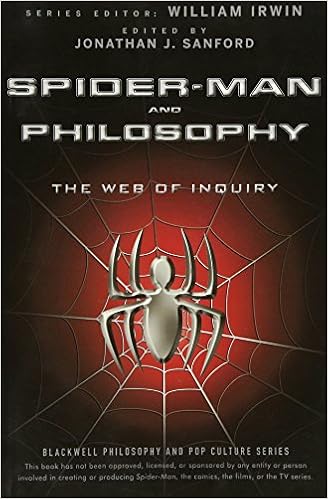Reading Level
What is the reading level of Spider-Man and Philosophy: The Web of Inquiry?
Analysing the books in the series, we estimate that the reading level of Spider-Man and Philosophy: The Web of Inquiry is 7th and 8th grade.
Expert Readability Tests for
Spider-Man and Philosophy: The Web of Inquiry
| Readability Test | Reading Level |
|---|---|
| Flesch Kincaid Scale | Grade 8 |
| SMOG Index | Grade 11 |
| Coleman Liau Index | Grade 9 |
| Dale Chall Readability Score | Grade 7 |
Reading Time
5 hrs 9 mins
How long to read Spider-Man and Philosophy: The Web of Inquiry?
The estimated word count of Spider-Man and Philosophy: The Web of Inquiry is 77,035 words.
A person reading at the average speed of 250 words/min, will finish the book in 5 hrs 9 mins. At a slower speed of 150 words/min, they will finish it in 8 hrs 34 mins. At a faster speed of 450 words/min, they will finish it in 2 hrs 52 mins.
| Spider-Man and Philosophy: The Web of Inquiry - 77,035 words | ||
|---|---|---|
| Reading Speed | Time to Read | |
| Slow | 150 words/min | 8 hrs 34 mins |
| Average | 250 words/min | 5 hrs 9 mins |
| Fast | 450 words/min | 2 hrs 52 mins |
- Authors
-
William IrwinJonathan J. Sanford
More about Spider-Man and Philosophy: The Web of Inquiry
77,035 words
Word Count
for Spider-Man and Philosophy: The Web of Inquiry
8 hours and 17 minutes
Audiobook length
Description
Untangle the complex web of philosophical dilemmas of Spidey and his world―in time for the release of The Amazing Spider-Man movie Since Stan Lee and Marvel introduced Spider-Man in Amazing Fantasy #15 in 1962, everyone’s favorite webslinger has had a long career in comics, graphic novels, cartoons, movies, and even on Broadway. In this book some of history’s most powerful philosophers help us explore the enduring questions and issues surrounding this beloved superhero: Is Peter Parker to blame for the death of his uncle? Does great power really bring great responsibility? Can Spidey champion justice and be with Mary Jane at the same time? Finding your way through this web of inquiry, you’ll discover answers to these and many other thought-provoking questions. Gives you a fresh perspective and insights on Peter Parker and Spider-Man’s story lines and ideas Examines important philosophical issues and questions, such as: What is it to live a good life? Do our particular talents come with obligations? What role should friendship play in life? Is there any meaning to life? Views Spider-Man through the lens of some of history’s most influential thinkers, from Aristotle, Thomas Aquinas, and Immanuel Kant to Nietszche, William James, Ayn Rand, and Alasdair MacIntyre
